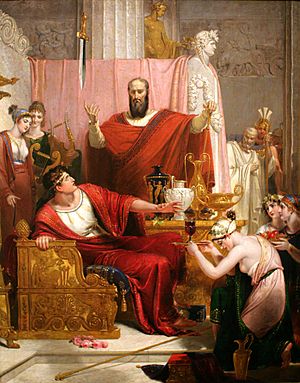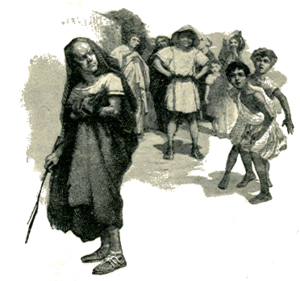Dionysius II of Syracuse facts for kids

Dionysius the Younger, also known as Dionysius II, was a Greek leader. He ruled the city of Syracuse, Sicily for two periods. He was in charge from 367 BC to 357 BC, and again from 346 BC to 344 BC.
Contents
Who Was Dionysius II?
Dionysius II was the son of Dionysius the Elder and Doris of Locri. When his father died in 367 BC, Dionysius II became the ruler. He was young and new to leading a city. His uncle, Dion, helped him.
Dion was worried about Dionysius's behavior. So, he invited his teacher, the famous philosopher Plato, to Syracuse. Plato and Dion wanted to help Dionysius become a wise and fair ruler. They hoped he would be a "philosopher-king," someone who rules with great wisdom.
Dionysius Takes Full Control
However, some people did not like Dion's ideas for changes. Dionysius listened to these people. In 366 BC, he worked with a historian named Philistus. They sent his uncle Dion away from Syracuse. After this, Dionysius took complete power.
Without Dion, Dionysius's rule became less popular. He was not very good at leading people or commanding soldiers. Plato asked Dionysius to let Dion return. But Dionysius became annoyed. He took away Dion's property and gave Dion's wife to another man.
Before this, Dion had lived peacefully in Athens using money from his lands in Syracuse. But Dionysius's actions made Dion decide to fight back.
Dionysius Loses Power
In 357 BC, Dion gathered a small army. He returned to Sicily. The people of Syracuse were very happy to see him. Dionysius was in Caulonia, Italy at the time. So, Dion easily took control of almost all of Syracuse. Only the island fortress remained under Dionysius's control.
Dionysius quickly sailed back to Syracuse. He tried to attack from the fortress and also tried to make peace deals. When nothing worked, he sailed to Locri. He left his son, Apollocrates, in charge of the fortress.
Life in Exile and Return
While Dionysius was away, he became the ruler of Locri. He treated the people there very harshly. He did not return to Syracuse until 346 BC. This was eight years after Dion had been killed by his own officers.
Soon after Dionysius left Locri, the local people drove out his remaining soldiers. They also took revenge on Dionysius's wife and daughters. Dionysius was still not popular in Syracuse. But he was able to get power back because the city was very unstable. Many other cities in Sicily had left Syracuse's control and were ruled by their own leaders.
Several of these cities joined the Syracusans to attack Dionysius. They were very successful. Dionysius was forced back into the fortress.
Surrender to Timoleon
In 344 BC, a new leader named Timoleon arrived in Sicily. He began to invade the island. Dionysius respected Timoleon. He also knew he could not win. So, he agreed to give up the fortress. He was allowed to travel safely to Corinth.
Dionysius died the next year in Corinth. He lived in increasingly difficult conditions until his death.
Plato's Test of a Philosopher
In a famous letter called the Seventh Letter, Plato writes about Dionysius II. This letter describes Plato's ideas about how a true philosopher learns. After Plato's second visit to Sicily, he heard that Dionysius II was making great progress in philosophy.
Plato visited a third time to test Dionysius II. He wanted to see if Dionysius had truly become a philosopher. Plato believed that a real philosopher would accept the hard work needed to gain wisdom. People who were not truly interested would give up.
Plato thought that a genuine philosopher would organize their daily life to help them learn and think better. By explaining how hard philosophical life was, Plato could tell who was serious. He believed philosophers needed to be strong and determined. Those who avoided hard work were not true philosophers.
When Plato explained the difficult nature of philosophy, Dionysius II said he already knew most of Plato's teachings. Plato even thought Dionysius II might have written a book about his own philosophical knowledge. By refusing more training, Dionysius II failed Plato's test.
See also
 In Spanish: Dionisio II de Siracusa para niños
In Spanish: Dionisio II de Siracusa para niños
 | Claudette Colvin |
 | Myrlie Evers-Williams |
 | Alberta Odell Jones |


